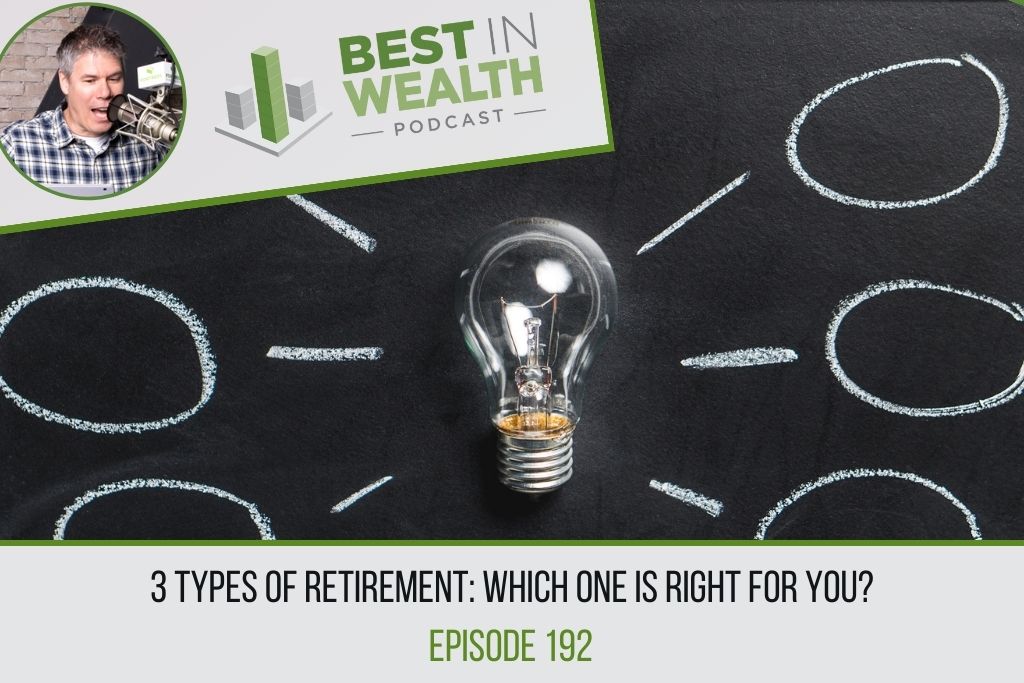3 Types of Retirement: Which One is Right for You? Ep #192

We are all used to traditional retirement—save money and fully retire when you hit retirement age. But did you know that there are two other types of retirement? The other two types may even have a better impact on your mental health and sense of purpose in your retirement years. In a black and white world, multiple answers do not exist. But sometimes there is more than one right answer. In this episode of the Best in Wealth podcast, I will share the three types of retirement and help you think through which one is right for YOU.
Did you know there are 3 types of retirements? Learn which path is right for you in this episode of Best in Wealth! #wealth #retirement #investing #PersonalFinance #FinancialPlanning #RetirementPlanning #WealthManagement Click To TweetOutline of This Episode
- [1:15] Can you live in the gray instead of black and white?
- [3:48] How retirement impacts your sense of purpose
- [9:22] The three different types of retirement you can consider
- [17:42] Plan your finances according to your chosen type of retirement
How retirement impacts your sense of purpose
Most of us are working hard now so that someday we do not have to worry about working. Retirement is viewed as a time of freedom. It is when you have the opportunity to do whatever you want with your time. Research has shown that retiring can lead to gains in satisfaction and decreases in depression.
However, research has also shown that retirement reduces an individual’s sense of purpose. When you work, you are contributing to society and people are counting on you. When you leave, you may feel less purpose. We often forget about this aspect of retirement.
Individuals who do have a career with a sense of purpose need to consider how they will replicate this feeling in retirement. I check in with my retired clients regularly to see how retirement is going. Why? Because many new retirees experience an initial heightened sense of emotions—i.e. the honeymoon phase. After that feeling wears off, they feel like they are lacking a sense of purpose.
Socioeconomic status and its impact on purpose
An article entitled, “The Effects of Retirement on Sense of Purpose in Life: Crisis or Opportunity?” explored the question: Does socioeconomic status have an impact on one’s sense of purpose after retirement? The authors found that retirement had a positive impact on the sense of purpose of individuals with low socioeconomic status. It seems backward, right? But many of those with a low socioeconomic status did not have jobs that provided a sense of purpose in the first place. How could they lose a sense of purpose they never felt? Being free of an unsatisfying job to pursue meaningful activities improved their sense of purpose—even if it means living with a reduced income.
How does socioeconomic status impact one’s sense of purpose in retirement? Listen to this episode of Best in Wealth to hear the surprising results of a study. #wealth #retirement #investing #PersonalFinance #FinancialPlanning #RetirementPlanning… Click To TweetThe three different types of retirement
In his article, “3 Types Of Retirement And Their Very Different Savings Strategies,” Michael Kitces describes three different types of retirement. Which one resonates with you?
- Traditional retirement: You save early and often. Your socioeconomic status is probably average or high. You invest prudently for growth and retire as soon as able. If you grow your portfolio fast enough, you can even retire early. Your time in retirement is filled with leisure or volunteer work. You are not thinking about earning more money. Will you still feel a sense of purpose?
- Semi-retirement: Work is scaled back but not eliminated. This might include starting a new business or career, becoming a consultant, or working part-time. Semi-retirement means retiring from a full-time job but not from any work. You likely need ongoing paid work. This helps lend personal fulfillment. It also provides substantial ongoing financial assistance. If you are thinking of semi-retirement, you can reach this earlier than traditional retirement. I work with clients who have retired and switched to consulting for the same company they had worked full-time for.
- Temporary retirement: These are sabbatical breaks that occur after which you return to the working world, either in a new job or career track. The retirees in this category actually never retire. Instead, breaks are dispersed regularly throughout productive years. Have you taken a sabbatical before then started a new career path? These people are recharging their batteries throughout life. Retirement years would be shortened as they have been redistributed into earlier years of life. What a different way to frame retirement.
If you want to keep your sense of purpose, a series of temporary retirements throughout your career or a semi-retirement can improve your overall well-being. You want increases in life satisfaction, decreases in depression, and to maintain your sense of purpose. Learn more about how to determine which path is right for you in this episode of Best in Wealth!
In this episode of Best in Wealth, I share the three different types of retirement and help you think through which type is the best for you! #wealth #retirement #investing #PersonalFinance #FinancialPlanning #RetirementPlanning #WealthManagement Click To TweetResources Mentioned
- The Effects of Retirement on Sense of Purpose in Life: Crisis or Opportunity?
- 3 Types Of Retirement And Their Very Different Savings Strategies
Connect With Scott Wellens
- Schedule a discovery call with Scott
- Send a message to Scott
- Visit Fortress Planning Group
- Connect with Scott on LinkedIn
- Follow Scott on Twitter
- Fortress Planning Group on Facebook
Audio Production and Show notes by
PODCAST FAST TRACK
https://www.podcastfasttrack.com
Podcast Disclaimer:
The Best In Wealth Podcast is hosted by Scott Wellens. Scott Wellens is the principal at Fortress Planning Group. Fortress Planning Group is a registered investment advisory firm regulated by the Securities Act of Wisconsin in accordance and compliance with securities laws and regulations. Fortress Planning Group does not render or offer to render personalized investment or tax advice through the Best In Wealth Podcast. The information provided is for informational purposes only and does not constitute financial, tax, investment or legal advice.



